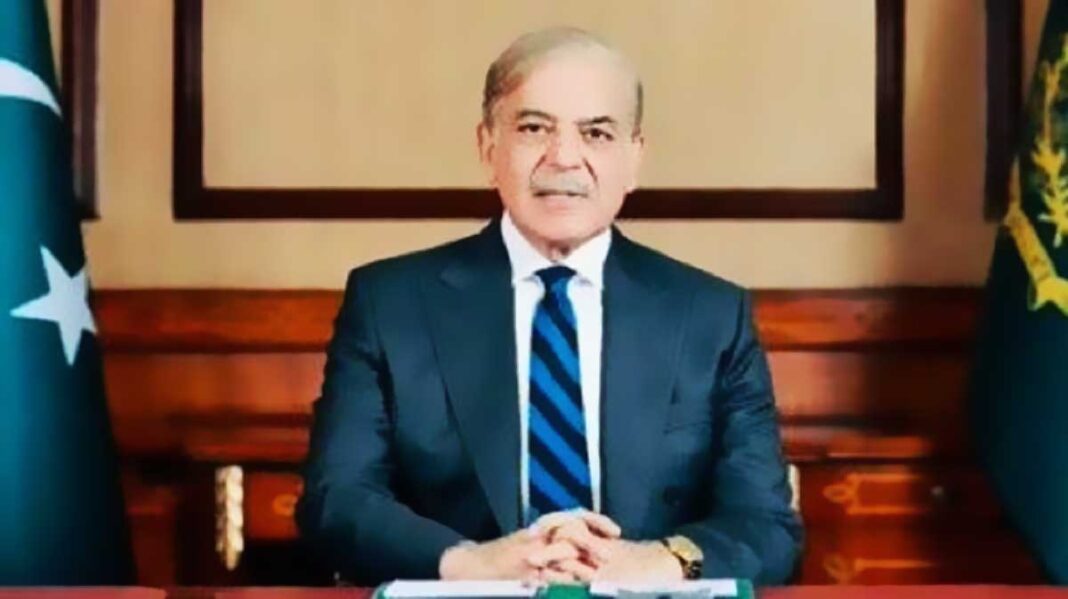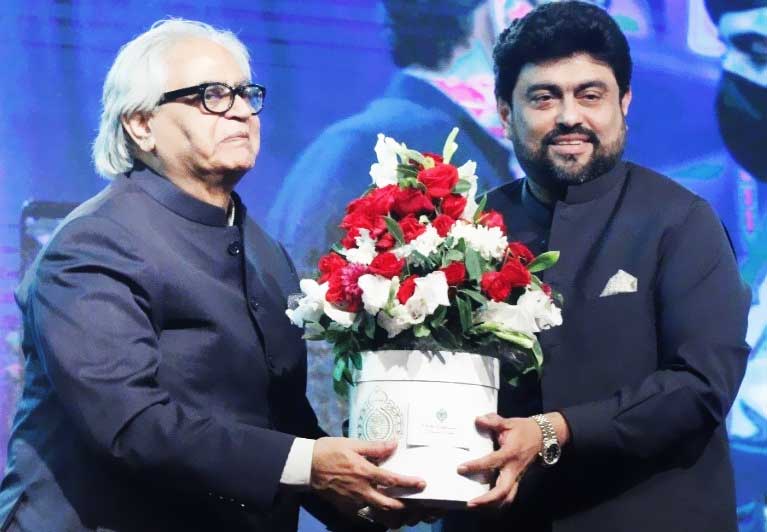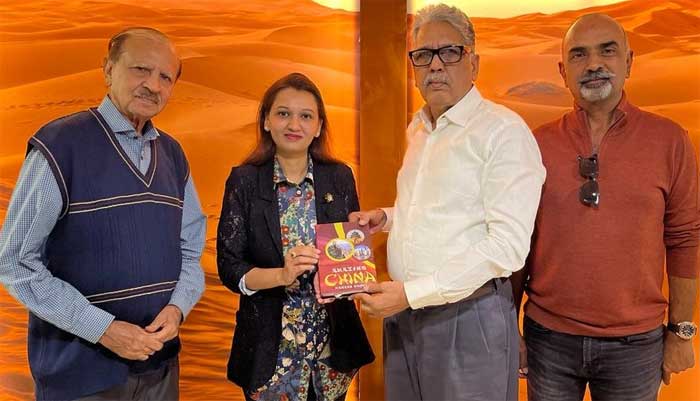The PM declares that the Journalist Safety Law would be actively implemented, ensuring their freedom.
ISLAMABAD: Prime Minister Shehbaz Sharif on Tuesday said media freedom and democracy reinforced each other and expressed his government’s resolve to support an environment for journalists free of intimidation and harassment.
“My government believes that no journalist or human rights activist should be called out in the line of duty,” he said, expressing his firm resolve to proactively facilitate the implementation of the Journalists Safety Law.
Addressing at an event here to mark 10 years of the United Nations’ Plan of Action organized by Journalist Safety Forum, the prime minister termed a free media and freedom of expression the important pillars of a State.
Shehbaz Sharif said press freedom in Pakistan had been close to the hearts of journalists and civil society.
He said journalists of the country over the years greatly contributed to press freedom and mentioned that Hamid Mir, as the chairperson of Journalist Safety Forum, faced difficult challenges including an attempt on his life.
He termed the killing of prominent journalist Arshad Sharif an “extremely sad incident” and said that he soon after spoke to the government of Kenya and later wrote a letter to the Chief Justice of Pakistan to form a judicial commission.
Shehbaz Sharif said despite the chequered history with 33 years of military rule, the collective political efforts lead to resumption of democracy to put the country on right track.
He termed the 1973 constitution ‘a very sacred document’ which acted as a binding force among the units of the federation and ensured democratic values besides ensuring basic rights of citizens.
In 2013, he said,Pakistan became the first country in Asia to pass legislation on the safety of journalists and last year, the parliament passed the landmark ‘Protection of Journalists and Media Protection Act’.
Shehbaz Sharif, on requests of the media community, assured to look into the Section 6 of the Act to prevent harassment and intimidation of journalists.
He mentioned that there were still challenges facing the journalists in their line of duty and required sustained efforts by media, civil society, UN and international bodies.
He appreciated the contribution of international community in supporting economic and social development of Pakistan, particularly UNESCO and countries including Norway, Denmark and France.
He expressed confidence that the outcomes and recommendations of the Forum would help lead towards a free media in Pakistan.
Ambassador of France Nicolas Galey said freedom of expression could not be termed as an obstacle in the working of a government and emphasized the need to promote safety of journalists, media pluralism, and the right to inform and be informed. He lauded Pakistan’s law on the safety of journalists as a significant step in encouraging freedom of expression.
Ambassador of Denmark Linulf said it was crucial to promote freedom of expression and ensure a safe environment for journalists. He said Denmark backed the ‘community journalism’ in Pakistan. He congratulated Pakistan for its remarkable step to legislate on the safety of journalists, the first in Asia.
Ambassador of Norway Per Albert Ilsaas said best quality journalism provides proper information and ensure democratic values. Pakistani journalists, he said “self-censored” the content, which could otherwise be said directly, such the use of word “establishment”.
Chairperson Journalist Safety Forum Hamid Mir proposed that federal and Sindh governments must notify the safety commissions under the laws passed by the National Assembly and stressed passage of similar laws for the journalists of Khyber Pakhtunkhwa, Balochistan and Punjab.
He demanded immediate removal of the Section 6 from the Federal Journalists Safety Law, which acts as a pre-qualifier for journalist before benefiting from the law, and pointed out that it was “mysteriously” added to the final draft bill without the knowledge of journalists.
He called for taking journalists out of the purview of online expression through laws such as PECA (Prevention of Electronic Crimes Act) or other regulations and emphasized support by the federal and provincial governments against attacks, intimidation and harassment of women journalists.
The event was attended by journalists, human rights experts and representatives of national and international organizations.
Meanwhile, Prime Minister Shehbaz Sharif on Tuesday welcome the Suo moto notice taken by the Supreme Court on the killing of prominent journalist Arshad Sharif.
He assured that the government would extend full cooperation to the Court.
“I welcome Supreme Court taking suo moto notice of the murder of journalist Arshad Sharif,” he said in a Twitter post.
Shehbaz Sharif mentioned that he had already written a letter to the Chief Justice of Pakistan for setting up a judicial commission to probe the murder.
The Supreme Court on Tuesday headed by Chief Justice of Pakistan Umar Ata Bandial directed the government to register a first information report (FIR) by tonight.
The court also sought the inquiry report of the committee formed by the government to probe the killing of Arshad Sharif.
Meanwhile, Prime Minister Muhammad Shehbaz Sharif on Tuesday said that a process of revisionism put into motion by the Hindu extremists had become a living nightmare for Indian Muslims and other minorities.
On his Twitter handle, the prime minister referred to the 30th anniversary of demolition of historic Babri Mosque which was razed to ground by the Hindu zealots in Ayodhya, India during 1992.
The prime minister urged the world community to take note of the rising religious hatred in India.
“Today marks the 30th anniversary of demolition of historic Babri Mosque. A process of revisionism put into motion by Hindu extremists has now become a living nightmare for Indian Muslims & other minorities. World needs to take note of rising religious hatred in India,” the prime minister posted a tweet along with pictures of the demolished mosque.
Meanwhile, Prime Minister Shehbaz Sharif on Tuesday paid tribute to the former senior president of the women’s wing of Pakistan Muslim League (Nawaz) and senior parliamentarian Najma Hameed for her contribution towards democracy and the party.
The prime minister visited the residence of the late Najma Hameed who passed away recently and offered Fatiha for her soul to rest in peace.
He extended condolences to Najma Hameed’s sons, her sister Tahira Aurangzeb and niece Marriyum Aurangzeb and said Najma Hameed was a valuable asset to the party.
Meanwhile, Amir of Jamiat-e-Ulema Islam (F) Maulana Fazlur Rehman on Tuesday called on Prime Minister Muhammad Shehbaz Sharif.
During the meeting, the overall national and political situation was discussed.
Meanwhile, Prime Minister Muhammad Shehbaz Sharif and Sindh Chief Minister Syed Murad Ali Shah on Tuesday agreed to further strengthen the mutual cooperation between the federal and provincial governments for the public welfare and development.
The Sindh chief minister called on the prime minister. During the meeting, they discussed the overall national and political situation of the country, the PM Office Media Wing said in a press release.
They also discussed the rehabilitation work in the flood-affected areas of the province. – APP




